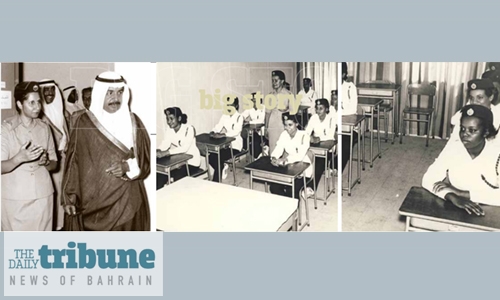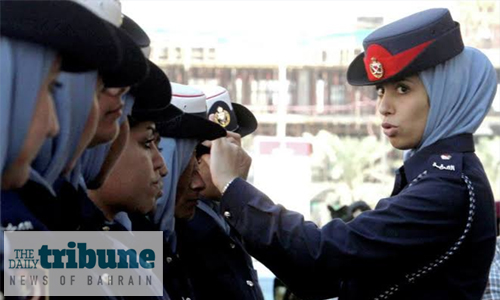Bahrain’s invisible heroes
Bahraini policewomen?
They have those? Back in 2005, a top foreign embassy official exclaimed when a researcher told him about women police officers in the Kingdom.
Surprisingly, the person in question was someone who was in charge of cooperating with local security forces as part of the Regional Security Office in the Kingdom. Laleh Khalili and Jillian Schwdler, in their book ‘Policing and Prisons in the Middle East: Formations of coercion’, use those words to explain the invisibility of Arab policewomen in the Middle East at that time.
Those remarkds, according to them, were mainly due to “a larger selective viewing” or due to the colonial gaze which fails to “see” beyond the stereotypical construction of women in the region.
Fast forward to 2019
Times have changed, so have perceptions. The concept of modern policing found its way into the Kingdom and got evolved. Now, with over 100 years of experience, Bahraini police force, both men and women, have become a formidable force in the region. Bahrain now enjoys a “rich history of championing women’s rights in the region”, where female workers represent more than 48 per cent of the total Bahraini workers.
Not my words, but that of Awatif Hasan Al-Jishi, the first female police officer in the Arab world. According to her, by integrating women into the police force, Bahrain served as a guiding light for its regional neighbours. Al Jishi was one of the first of the two female police officers to enter Bahrain’s police forces in 1970 when the Kingdom opened its doors to women inclusion.
According to Al Amn magazine, the then Minister of Interior, His Highness Sheikh Mohammaed bin Khalifa Al Khalifa assigned them to work in the social affairs section of the Labour Department. Now, within every police station in Bahrain, there is a female police unit to handle cases involving women or child victims and offenders.
Female police officers also have their presence in traffic directorate, immigration, Criminal Investigation Division, social care unit as well as child protection units.
General Directorate of Women
General Directorate of Women Police, officially formed in 1979, does the coordination. Al Jishi was also one of the highest-ranking police officials to handle the responsibility of Women Police Directorate (2001) in the rank of Brigadier.
She achieved this rank in 2006 after thirty-six year of service. At that time, she was also one of the five police officers who hold that rank within the Ministry of Interior.
The start
“I was recruited alongside one other colleague—Aisha Al Thawadi—to become the first two female police officers in the country. Initially, our unit handled cases involving female and child victims and offenders,” Al Jishi wrote in an article published by Wilson centre. However, in the beginning, back in 1970, when Al Jishi entered the force, things were different.
There were patriarchal issues to resolve. They were less in number. They were just eight in number in 1972, that too with the addition of six female high school graduates. “I never imagined that I would become a police officer,” Al Jishi wrote in Enheduanna, a blog run by the Middle East Women’s Initiative (MEWI) at the Wilson Centre. For her, joining the force was nothing more than a mere coincidence, as her intentions were different.
Returning to Bahrain from Cairo with a degree in social sciences, she was aiming for an opportunity in social service and started knocking doors in Bahrain. Fortune, however, had something different for her in its store. It was one such knock that opened her the door to policing.
At that time, the authority of social welfare was looking for a candidate to enter the force, and Al Jishi landed right before them at the right time. After much deliberation, she took up the challenge. Later, as we all know, she led to the overhauling of the system to create better atmospheres for juveniles and female prisoners.
Juvenile care law
At first, the team were assigned to handling family and juvenile issues as part of community policing. And that produced great results. Al Jishi’s efforts resulted in the creation of the juvenile care law, which received a parliamentary nod in 1976.
All this not without hardship. But as Al Jishi says, “Thankfully, the internal leadership at the police supported us tremendously—they knew that we were a critical asset to the security forces and sought out ways to help us grow.”
“I enjoyed working from day one as I was lucky to be involved in the primary development stages of the Kingdom in general and the ministry in particular.” Standing with her in this endeavour, Al Jishi says, was her family and her colleagues.
“Though there is still a lot of work to be done in terms of women’s rights in the region as a whole, in Bahrain we have played a key role in shaping our community and society—even in spheres like the security that have traditionally been seen as masculine. I am proud to be part of this history,” her blog reads.
Al Jishi retired after serving the Ministry of Interior for 37 years. At the time of her retirement, she was working as an advisor to the Minister of Interior and the only woman police officer with the rank of brigadier in Bahrain.
Hundreds now
Today, as she says, “there are hundreds of women in the security forces in Bahrain” who are playing an influential role in the Kingdom’s women empowerment drive.
The current General Director of the Women’s Police Directorate, Brigadier General Mona Abdulraheem, trained the first batch of policewomen in Kuwait in 2008 and helped establish their police unit, Al Jishi says.
Taking to Almn, Mona Abdulraheem said they were confident of overcoming all those initial difficulties in developing women policing in the Kingdom with “determination and patience to prove our ability.” By 2010, women in Kingdom had made their presence in almost all crucial departments of the police force by displaying proficiency on par or exceeding their male counterparts.
A new dawn
“A new dawn in the women’s police sector was launched in 2004 when His Majesty King Hamad bin Isa Al Khalifa issued a Royal Decree appointing His Excellency General Sheikh Rashid bin Abdullah Al Khalifa as Minister of Interior,” Mona Abdulraheem told Almn.
A strategy was developed to include women police in the Ministry and directives were issued to recruit graduates to the force. This was a big step for the development of women policing in the Kingdom. As Mona Abdulraheem says, “they now even work in special forces that require extreme physical strength.” Special operation battalion, helicopter engineering service, rapid intervention force; you name it and they are there.
Women’s have proved their mettle beyond doubts. One notable development that deserves attention is the introduction of women only traffic patrols. Introduced in April 2018, the members of the force were selected after extreme vetting. The patrols commenced operation during the hosting of the Bahrain Grand Prix Formula One.
As Bahrain’s police continue to evolve and commemorates its journey through 100 years of establishment, it was people like Al Jishi who with their dedication and enthusiasm served as a guiding force to the Kingdom in its pioneering efforts to establish and develop women policing in the Kingdom.
Today female police officers are not a rare sight. They can be seen in almost every law enforcement agencies around the world and are just as competent as their male counterparts. So what better way to commemorate Bahrain’s policing journey, other than remembering heroes like her, who continues their work by remaining ‘invisible’.
Related Posts


